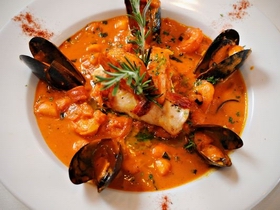
"The basics of it are really great ... focusing on not necessarily just reducing one thing or another — for example, just low fat or low protein or low carb," said Dr. Julie Anderson, a family physician at Minnesota's St. Cloud Medical Group. "It's more about making wise and healthy choices."
The heart-healthy eating plan combines elements of Mediterranean-style cooking of countries bordering the Mediterranean Sea. The Mediterranean diet traditionally includes fruits, vegetables, pasta and rice.
"It's more of an olive oil-based diet rather than just the trans fats that we tend to see, and it's all about healthy, natural foods rather than pre-prepared foods, and emphasizing vegetables and fruits rather than red meat and whole grains instead of processed grains," Anderson said.
Pan-Mediterranean cuisine includes foods from regions ranging from the south of Italy, France, Greece, Spain, Turkey and Morocco to the Eastern and Middle Eastern Mediterranean.
"The Mediterranean diet is extremely healthy — being lower in processed foods and animal fats — and is often based on local produce, wheat products, such as bread, pastry and pasta, fresh fruit and vegetables, fish and olive oil," said Jim Rakhshani, general manager of Cafe Renaissance in Waite Park , Minn.
Rakhshani said business is up at the restaurant since the Mediterranean diet made headlines recently based on its health benefits.
"It's the Mediterranean lifestyle choice that those people who live in the Mediterranean choose to live by, partly because they haven't been influenced by Western pressures and partly because they can't get access to the prepared foods that America has," Anderson said.
For example, residents of Greece eat very little red meat and average nine servings a day of antioxidant-rich fruits and vegetables, according to the Mayo Clinic.
"They don't run to McDonald's or Burger King because they don't have access to those things," Anderson said. "They grow their foods locally and process them themselves, typically, or raise them in their backyard, so it's just a different way of living."
The Mediterranean diet typically includes a moderate amount of wine; alcohol has been associated with a reduced risk of heart disease in some research studies.
"Red and white wine is the basis of almost all of our dishes," Rakhshani said of Cafe Renaissance.
The Mediterranean diet discourages saturated fats and hydrogenated oils, which contribute to heart disease, and features olive oil as the primary source of fat.
"It's just simple, whole foods that have not been prepared for you. It's basic fruits and vegetables. It's olive oil instead of heavy fats and butter, and then low red meat and eating a lot of fish and chicken, which is available at any grocery store," Anderson said.
Key components of the diet
The Mediterranean diet emphasizes:
-- Getting plenty of exercise
-- Eating primarily plant-based foods, such as fruits and vegetables, whole grains, legumes and nuts
-- Replacing butter with healthy fats such as olive oil and canola oil
-- Using herbs and spices instead of salt to flavor foods
-- Limiting red meat to no more than a few times a month
-- Eating fish and poultry at least twice a week
-- Drinking red wine in moderation (optional)





